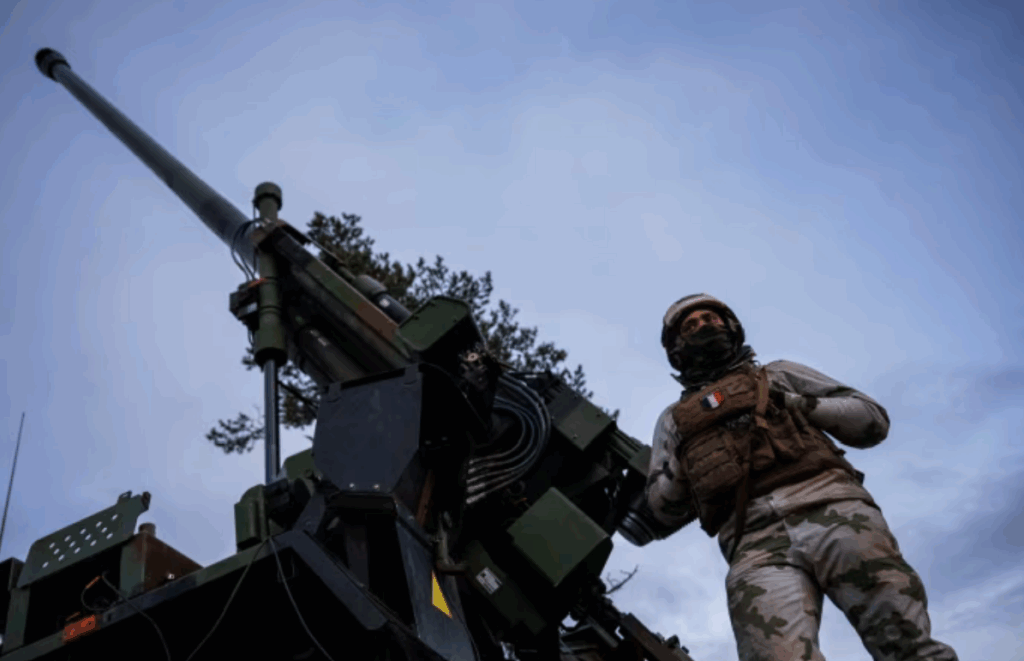PARIS (Realist English). France’s ambitions to dramatically scale up defence spending — and cement its role as a leading European military power — are facing serious headwinds from the country’s worsening fiscal outlook.
President Emmanuel Macron has called for raising annual military spending from roughly 2% to between 3–3.5% of GDP by 2030, targeting an annual outlay of €100bn — nearly double current levels. The increase is aimed at aligning with anticipated NATO guidelines and responding to US demands for greater European responsibility in security.
But with France’s debt-to-GDP ratio at 113% and a budget deficit of 5.8% in 2024 — the second worst in the eurozone after Greece and Italy — lawmakers and analysts are increasingly sceptical that such expansion is feasible.
“Given our worse starting point on debt, we’ll have to make more of an effort than other countries,” said former minister and Macron ally Clément Beaune, who now leads a government-backed think tank. Beaune warned that only a “radical push” — including spending cuts, structural reforms and possibly EU-wide borrowing — would enable France to finance the defence surge.
But tax hikes are off the table, according to Macron. Instead, he has tasked Prime Minister François Bayrou with identifying alternative funding paths. Bayrou has yet to present proposals, reportedly frustrating the Élysée.
Despite Macron’s rhetoric about building a “war economy” in the wake of Russia’s full-scale invasion of Ukraine, defence procurement has lagged. Officials say the Ministry of Armed Forces is facing cost overruns, in part due to commitments to Ukraine and NATO operations on the eastern flank. Payments totalling €8bn have been deferred, and industry leaders complain that few major orders have been placed so far this year.
The existing multi-year military plan already promised to raise defence spending from €36bn in 2019 to €67.4bn by 2030. Yet experts warn that inflation and rising weapons costs will eat into those gains — with the result being fewer advanced platforms rather than a broader force. France is now expected to have fewer Rafale jets (225 by 2035, down from 254 in 2021) and fewer main battle tanks (200 by 2035, down from 222 in 2021).
Critics warn this leaves France with a so-called “bonsai army” — maintaining all the components of a great power military, but at a scale too small for sustained operations.
Still, defence officials insist the budget roadmap through 2030 remains intact and that capability gaps are being reviewed ahead of NATO’s June summit. “Scaling back planned increases is not at all on the table,” one official said.
Nuclear deterrence remains a central pillar of France’s defence identity. Roughly 13% of the military budget is allocated to strategic forces, including submarines and aircraft, which give Paris independent control over its deterrent posture. This also shapes France’s reluctance to join NATO’s nuclear sharing arrangements or seek coverage under the US nuclear umbrella.
Yet rising costs threaten to erode that margin of strategic independence. In 2023, France spent €59bn servicing its debt — more than its defence budget. That figure is projected to reach €107bn by 2029, overtaking even education.
France has also so far refused to invoke the EU’s “escape clause”, which would temporarily exempt defence spending from deficit rules. Other major EU economies — including Germany and Poland — have applied to do so, citing national security concerns. Paris fears such a move could alarm bond markets and drive up borrowing costs.
Macron has called for more EU-level defence initiatives, including joint borrowing and collective arms procurement. But progress remains limited, with the latest European Commission plans relying mainly on national financing.
As Germany and Poland race ahead in military investment, some warn France risks falling behind. “We tend to think of ourselves as the only serious players,” said Élie Tenenbaum, defence analyst at France’s Ifri think tank. “But that’s no longer true.”
France’s defence future now hangs on whether it can reconcile its fiscal constraints with its geopolitical ambitions — and whether Europe can move fast enough to avoid strategic fragmentation.
